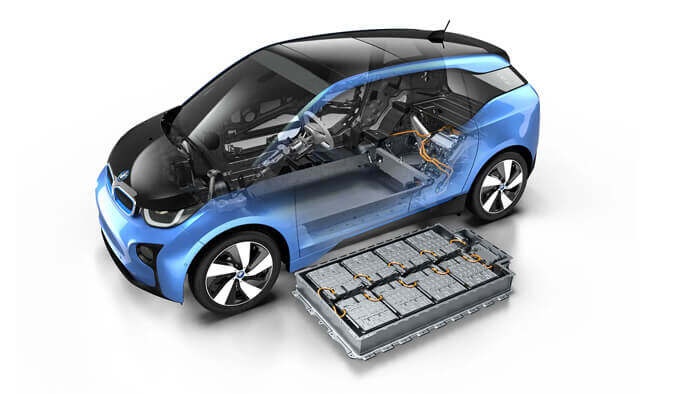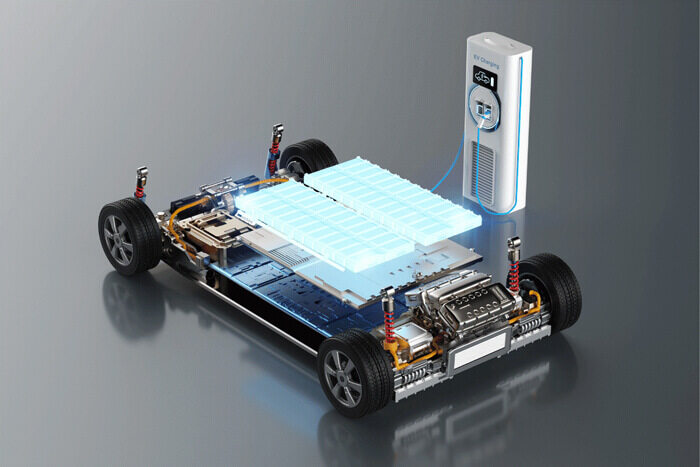Contents:
The shift toward electric vehicles (EVs) is reshaping the automotive landscape, with lithium-ion (Li-ion) batteries taking center stage as the primary power source for these eco-friendly vehicles. Lithium batteries have revolutionized the way we think about energy storage in cars, providing numerous advantages that make them the go-to option for electric mobility. In this article, we’ll explore the critical role that lithium batteries play inside cars, their benefits, and their impact on the automotive industry today.

Why Lithium Batteries Are the Preferred Choice for Cars
Lithium-ion batteries have quickly become the most widely used power source for electric cars. Several factors contribute to their dominance, with key features that make them the optimal choice for modern vehicles:
-
High Energy Density
One of the most significant benefits of lithium-ion batteries is their high energy density. This allows them to store more energy in a smaller, lighter package compared to other battery types, such as lead-acid batteries. For vehicles, this means more energy storage with less weight, resulting in a better driving range for electric vehicles.
-
Extended Lifespan
Lithium batteries are known for their long life cycles, which means they can endure hundreds, if not thousands, of charge and discharge cycles while maintaining a high level of performance. This extends the lifespan of electric vehicles, providing car owners with long-term value and reducing the need for battery replacements.
-
Faster Charging Times
In comparison to traditional lead-acid batteries, lithium-ion batteries charge much more quickly. This reduced charging time is especially important in electric vehicles, where charging infrastructure is still developing. With faster charging capabilities, drivers experience less downtime, making electric cars more convenient for daily use.
-
Lightweight Design
Given the performance demands of vehicles, weight plays a significant role. Lithium-ion batteries are much lighter than their counterparts, such as lead-acid or nickel-cadmium batteries, which helps in improving the overall efficiency of the vehicle. This lightweight advantage contributes to better acceleration, handling, and overall vehicle performance.
How Lithium Batteries Work Inside Cars
Inside a vehicle, lithium-ion batteries power various components, including the motor, climate control, infotainment systems, and more. When a car is in operation, the battery discharges and releases energy to the vehicle's electric motor, which propels the car forward. This process is highly efficient, with minimal energy loss, which is essential for maximizing range and performance.
The battery is integrated into the vehicle’s power management system, which ensures that the battery is properly charged and maintained. The vehicle’s onboard systems monitor factors such as temperature, voltage, and current to optimize the battery’s performance and prevent overheating or other issues that might reduce its lifespan.
Benefits of Lithium Batteries for Electric Vehicles
Lithium-ion batteries offer a multitude of benefits for electric vehicles that make them the preferred option in the automotive industry today. Some of the standout advantages include:
-
Environmental Impact
One of the most significant contributions of electric vehicles, powered by lithium-ion batteries, is the reduction in carbon emissions. Unlike gasoline and diesel-powered vehicles, EVs produce zero tailpipe emissions, contributing to cleaner air and a reduction in overall environmental pollution. The shift to electric vehicles is a crucial step in fighting climate change and reducing our reliance on fossil fuels.
-
Cost Efficiency
Although lithium-ion batteries can be more expensive upfront than traditional battery types, their long lifespan and lower maintenance costs result in significant long-term savings. With fewer battery replacements and reduced operating costs, electric vehicles powered by lithium batteries are becoming increasingly cost-efficient over time.
-
Quiet Operation
Lithium-ion battery-powered vehicles are also known for their quiet operation. Since electric cars don’t rely on internal combustion engines, they produce far less noise, providing a smoother and quieter driving experience. This feature not only benefits drivers but also reduces noise pollution in urban environments.
-
Energy Efficiency
Electric vehicles powered by lithium-ion batteries are significantly more energy-efficient than their internal combustion engine counterparts. EVs convert more energy from the battery to power the wheels, whereas conventional vehicles lose more energy through engine heat and other processes. This efficiency translates into lower energy consumption, making electric vehicles a more sustainable option for transportation.

Challenges of Lithium Batteries in Cars
While lithium-ion batteries are undoubtedly a game-changer for electric vehicles, they do come with some challenges that need to be addressed. These challenges are critical to understand, as they impact both the consumer experience and the broader industry.
-
Cost
Despite decreasing in price over the past few years, lithium-ion batteries are still one of the most expensive components of an electric vehicle. This high cost contributes to the overall price of electric cars, which can be a barrier for some potential buyers. However, ongoing advancements in manufacturing processes and economies of scale are expected to continue driving down the price of batteries in the coming years.
-
Battery Degradation
Over time, lithium-ion batteries degrade and lose their ability to hold a charge, reducing the range and efficiency of the vehicle. However, the impact of degradation has been minimized thanks to improvements in battery management systems, which help monitor and manage battery health. Many manufacturers now offer long-term warranties that cover battery degradation, providing additional peace of mind for consumers.
-
Limited Charging Infrastructure
Although charging networks are expanding globally, one of the main concerns for electric vehicle owners is the availability of charging stations. This limitation can create “range anxiety,” where drivers worry about running out of battery before reaching a charging point. As the adoption of electric vehicles grows, infrastructure improvements will be crucial to ensuring that charging stations are widely available and accessible.
-
Raw Material Sourcing
Lithium-ion batteries require raw materials such as lithium, cobalt, and nickel. The extraction of these materials can have environmental and ethical concerns, particularly in regions where mining practices may cause harm to local ecosystems or workers. There is a growing push for responsible sourcing and recycling of these materials to reduce the environmental impact.
Conclusion
Lithium-ion batteries have become the driving force behind the electric vehicle revolution. Their high energy density, extended lifespan, fast charging times, and light weight make them an ideal power source for modern cars. While challenges such as cost, battery degradation, and infrastructure limitations remain, the benefits of lithium batteries far outweigh these concerns. They not only improve the performance and efficiency of electric vehicles but also play a critical role in reducing carbon emissions and promoting a more sustainable future for transportation. As more automakers embrace this technology, lithium batteries will continue to be a key component in shaping the future of the automotive industry.







